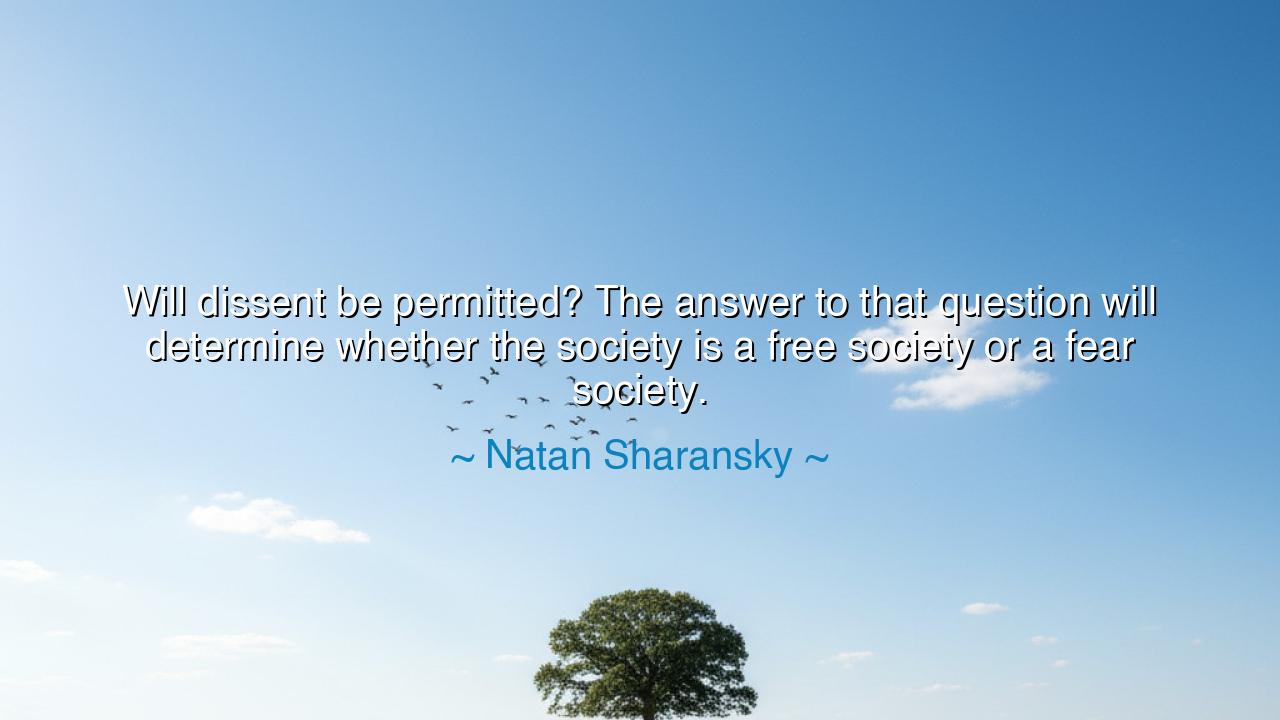
Will dissent be permitted? The answer to that question will
Will dissent be permitted? The answer to that question will determine whether the society is a free society or a fear society.






Hear the words of Natan Sharansky, the dissident who endured the iron grip of the Soviet regime, who asked the question that strikes at the heart of every civilization: “Will dissent be permitted? The answer to that question will determine whether the society is a free society or a fear society.” These words, born not in comfort but in the crucible of prison cells and solitary confinement, are not abstract philosophy but truth carved into the bones of one who lived under tyranny.
The meaning is as clear as the morning sun: the measure of freedom is not in the wealth of a people, nor in the grandeur of their monuments, nor in the strength of their armies. It lies in whether a man or woman may raise their voice against power without fear of destruction. A free society allows its people to question, to criticize, to disagree, for it trusts that truth can withstand scrutiny. A fear society, by contrast, silences tongues, imprisons bodies, and attempts to erase even the whisper of doubt. Where dissent is crushed, freedom dies.
History bears witness to this eternal struggle. Consider the fate of Socrates, who in ancient Athens asked questions too dangerous for the rulers of his time. Though Athens called itself the birthplace of democracy, it feared his dissent, and for it, he drank the hemlock. His death became a warning and a legacy: a society that cannot tolerate dissent devours its own freedom. Centuries later, the same pattern repeated in the trials of Galileo, who dared to declare that the earth moved around the sun. The church of his day feared dissent more than error, and thus chained knowledge itself.
Sharansky’s words arise from his own ordeal. Imprisoned for speaking truth in the Soviet Union, he spent years in isolation, deprived of liberty yet unbroken in spirit. The Soviet empire called itself mighty, yet its greatness was brittle, for it feared the words of one man. And indeed, as he foretold, a society built on fear cannot endure; the Soviet Union collapsed under the weight of its own lies, while the voices once silenced rose to shape the future.
The wisdom here is not only for nations but for every human community. A family that silences the questions of its children breeds fear. A workplace that punishes the truth spoken by its workers breeds resentment. A nation that imprisons its critics builds walls around itself, but those walls will one day fall. Only where dissent is permitted does trust grow, and only where trust grows can freedom endure.
The lesson for us, O seeker, is simple yet profound: cherish dissent. Do not fear disagreement, for it is the fire that tempers truth. Encourage voices that question, even when they are uncomfortable. Defend the right of others to speak, even when you oppose them. For to silence dissent is to invite fear, and to invite fear is to destroy the very foundations of liberty.
Therefore, take practical action: in your life, listen when others challenge you; in your community, protect those who speak out; in your nation, demand leaders who respect criticism rather than crush it. In doing so, you help build a free society, one where courage flourishes and fear withers. Remember always: a people who cannot question their rulers are already enslaved, even if their chains are invisible.
So let the wisdom of Natan Sharansky endure: the line between freedom and fear is drawn not by wealth, not by armies, but by the fate of the dissenter. If the question can be asked, if the protest can be heard, then society is free. If the voice is silenced, then the people live in fear. Guard dissent as sacred, for in its survival lies the hope of liberty for generations to come.






AAdministratorAdministrator
Welcome, honored guests. Please leave a comment, we will respond soon